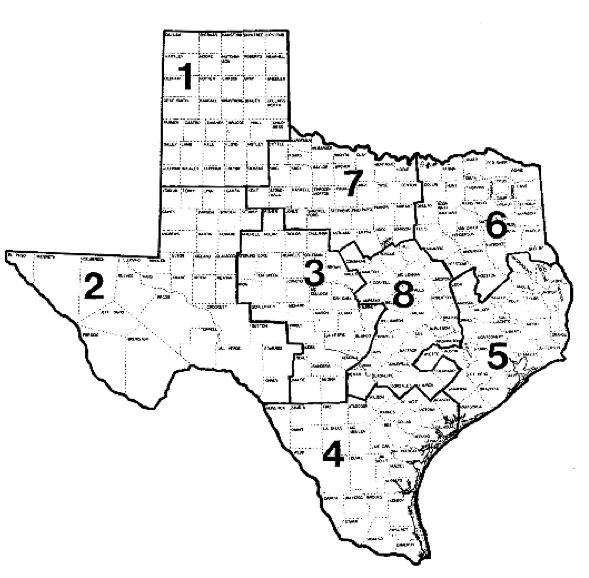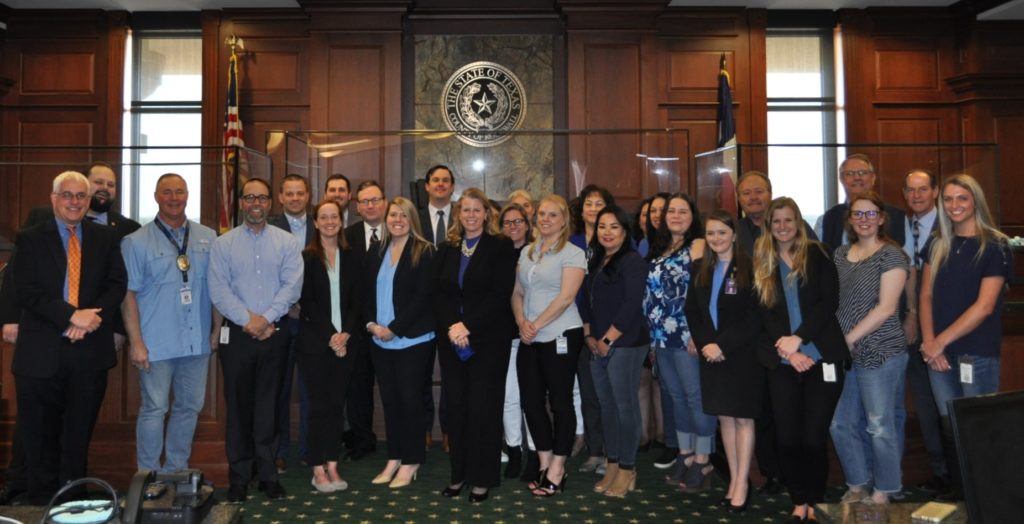By Jalayne Robinson, LMSW
TDCAA Director of Victim Services
Here at TDCAA, I am available daily to answer questions from TDCAA members about victim services. I thought it would be interesting and informative for you to read the latest questions we have received from the field, plus my answers.
Question
I recently read an article titled “The history of crime victims’ rights” by Suzanne McDaniel, former Victim Services Director for TDCAA (www.tdcaa.com/journal/the-history-of-crime-victims-rights). It is an enlightening view of the development of crime victims’ rights in Texas from 1985 up till 2005. I was wondering if you have at your fingertips a timeline of the continued evolution of victims’ rights from 2005 to the present. I am presenting to the local Citizens Police Academy and wanted to include three minutes on the history and development of crime victims’ rights in our state.
Answer
Below are a few links with a write-up on victims’ rights that may be helpful in developing your presentation:
• www.texasattorneygeneral.gov/sites/default/files/files/divisions/crime-victims/victim _rights15.pdf
• https://victimlaw.org/victimlaw/pages/victims Right.jsp
• https://ovc.ncjrs.gov/ncvrw2018/info_flyers/2018NCVRW_Landmarks_508.pdf
Question
Do Crime Victims’ Compensation victim benefits (counseling, mileage reimbursement, etc.) apply to pre-indicted cases, or do they have to wait until a case has been indicted before a crime victim can apply for benefits?
Answer
No indictment or arrest is necessary; however, the crime must have been reported to law enforcement and a law enforcement report/case number assigned before a crime victim can apply for the Crime Victims’ Compensation Program.
Question
Our office has a question regarding victim reimbursement for gas and mileage. We need to request that a victim come to our office for further questioning regarding the case. Is this something that can or should be reimbursed through county funds, or is there another way it should be handled? If it can be reimbursed, what are the specifics on that?
Answer
The State Comptroller of Texas has a Witness Fee Reimbursement Program for mileage, public transportation (airfare, taxi, shuttle, rental car), hotel, and meal costs for out-of-county witnesses who are subpoenaed by the court or summoned by the prosecuting attorney. Witnesses requested, subpoenaed, or summoned for grand jury proceedings, habeas corpus proceedings, pre-trial hearings, courts of inquiry, and examining trials are eligible to be reimbursed if they reside outside the county of the request. The program can reimburse the witness directly, or the witness can sign over the reimbursement to the county.
Here are links to claim forms and brochures explaining the Witness Fee Claim program:
• Checklist for Witness Fee Form Completion: https://comptroller.texas.gov/taxes/publications/96-762.pdf
• Witness Fee Reimbursement Claim form: https://comptroller.texas.gov/programs/support/judiciary/forms.php
If a crime victim has applied and been approved for CVC travel and lost wages, the Crime Victims’ Compensation Program has a travel and lost wages reimbursement benefit. This form (www.texasattorneygeneral.gov/sites/default/files/files/divisions/crime-victims/Awards_Travel_Appointment%20Verification%20Information%20Form.pdf) should be completed when the victim is requesting reimbursement for travel expenses or lost wages incurred to attend crime-related medical or counseling appointments, police investigation appointments, criminal proceedings, post-conviction or post- adjudication proceedings (executions), or a victim’s funeral.
Question
I have a notification question. We have a 17-year-old girl who is the victim of sexual abuse by her half-brother. Their mother knew about the abuse and never reported it. (Her case is being handled also.) My question is, “Is the law enforcement agency required to notify the biological father because the girl is 17 years old?” I do not think the victim has much contact with the bio father; he lives in another state, and I do not know what the girl told law enforcement about him. The bio father and stepmother found out about the abuse from mutual family friends and are not happy. They have contacted our office upset that they were not notified by law enforcement. Our elected district attorney wanted to know what the requirements are for notification. This is an unindicted case at this time.
Answer
Several attorneys at TDCAA, Children’s Advocacy Centers of Texas, the Texas Department of Criminal Justice’s Victim Services Division, and others have reviewed this question, only to find there is not a definitive answer in Texas law. Here is where we looked and what we found:
• Code of Criminal Procedure Art. 56A.051(13) references a victim of an assault or sexual assault who is “younger than 17 years of age,” meaning that 17 might be the cut-off age for a victim to be considered a child whose parents must be notified.
• CCP Art. 56A.401-402 talks about law enforcement notifications but does not specifically make reference to who gets notified.
• Prosecutor notifications are now located under CCP Art. 56A.451 but does not address who is entitled to receive notice of the crime.
• Texas Family Code §261.101 is the mandatory reporting statute, and it requires an individual to report suspicions of child abuse to either law enforcement or the Department of Family and Protective Services, but clearly that is different from requiring law enforcement to then report back to the biological father, as in this instance.
TDCAA did some general Lexis research and combed through the Family Code, Government Code, and Code of Criminal Procedure, and we did not finding anything regarding a parent’s right to notification by law enforcement. We looked in Chapter 411 of the Government Code and did not find anything regarding specific notification duties that law enforcement has. The only rights to notification were under the Family Code regarding reports of abuse, but they seem to be related to when a parent is being investigated for allegations of child abuse. Victims of crime (or their guardians) are entitled to certain rights addressed in Chapter 56A of the Code of Criminal Procedure—nothing specifically addressing this question, though.
Question
I noticed that the TDCAA Region 5 Victim Services Board representative’s term ends on December 31, 2021. What is the process for running for the board?
Answer
TDCAA’s Key Personnel–Victim Services Board elections will be held in-person at our Key Personnel–Victim Assistance Coordinator Conference on Thursday, November 11 at 1:00 p.m. at the Inn of the Hills Conference Center in Kerrville. In 2021, the East Area (Regions 5 and 6) and the South-Central Area (Regions 4 and 8) are up for election. Please see the map, below, to find out your region.

Question
I have a question about submitting my Victim Impact Statement (VIS) activity report. The information I’ve read says it needs to be done quarterly. Do I register through TDCJ’s Integrated Victim Services System (IVSS) website and report it there?
Answer
Yes, please create a profile in IVSS and select a username and password at this link: https://ivss.tdcj.texas.gov. Once you have created a profile, click “Add Monthly Statistics” to complete a VIS report. The VIS report is collected quarterly by the Texas Crime Victims Clearinghouse, but you can enter VIS activity monthly in IVSS.
Question
I have been told there is a newer version of the Victim Impact Statement (VIS) packet. How can I get a copy of the new version?
Answer
The latest version (updated in September 2019) of the VIS is available at tdcj.texas .gov/publications/victim_impact_statement.html#vis.
Question
I need to order more VINE (Victim Information and Notification Everyday) brochures in English and Spanish. Do you know where I can order them?
Answer
The Office of the Attorney General has a Crime Victims’ Materials Request Form with publications available for free at this website: www.texasattorneygeneral.gov/sites/default/files/files/divisions/crime-victims/Crime-Victims-Material-Request-Form.pdf.
That’s it! If you have a victim services question, please reach out to me at [email protected], and I’ll answer.
Key Personnel-Victim Services Board for 2021
For the first time ever, elections for the TDCAA Key Personnel-Victim Services Board were held via Zoom. The chairperson and representatives from the West Area (Regions 1 and 2), and North Central Area (Regions 3 and 7) were elected. Congratulations to Chair Amber Dunn, VAC in the Denton County CDA’s Office; Becca Kinikin, VAC in the 47th Judicial DA’s Office (Region 1); and Ebonie Daniels, VAC in the Wichita County CDA’s Office (Region 7)! Becca and Ebonie were elected to serve on the Board beginning January 1, 2021, for a two-year term. Amber, the chairperson, serves a one-year term.
Also in January 2021, two additional representatives (one KP and one VAC) were appointed by John Dodson, President of the TDCAA Board of Directors, and by Amber Dunn, Chair of the KP–VS Board. Congratulations to our newly appointed board members Adina Morris (KP) in the Palo Pinto County DA’s Office and to Karen Bertoni (VAC) in the Henderson County DA’s Office! See the whole list of KP–VS Board members in the box below.

The KP-VS Board prepares and develops training programs for TDCAA conferences. Area representatives serve as a point of contact for their regions. To be eligible for board service, each candidate must have the permission of his or her elected prosecutor; pay TDCAA membership dues; and either attend the elections at the KP-VAC Conference, attend the election process via Zoom, or be appointed to the Board. If you are interested in training and want to give input on speakers and topics at TDCAA conferences for KP and VACs, please consider running for the board.
If you have any questions, please email me at [email protected].
Go Blue for Kids
On April 1, the Rockwall County Criminal District Attorney’s Office gathered together, wearing blue for “Go Blue for Kids” in recognition of Child Abuse Prevention Month. Numerous awareness events and activities are planned in Rockwall County during April. Pictured below in the first row (left to right): Jeff Shell, Shane Cannon, Craig Stoddart, Cara Janes, Shelby Sedberry, Kenda Culpepper, Rachel Lines, Anna Gajkowski, Meredith Gross, Mandy Waite, Jordan Williams, Lacy Olvera, and Brinley Dougalas. In the second row (left to right): Destry Wilson, Justin Almand, John Cooper, Rachel Johnson, Gina Savage, Amie Gonzales, Mike Sandlin, Stacey Brezik, and Pat Kirlin. In the third row (left to right): Jacob Piper, Kelly Carter, Esther Miramontes, Brandi Dial, Felicia Oliphant, and Suzie Smith.

Upcoming TDCAA training
• Annual Criminal & Civil Law Conference, September 22–24, in Galveston
• Key Personnel & Victim Assistance Coordinator Conference, November 10–12, in Kerrville.
Please watch your mailbox (both email and snailmail) for brochures and alerts about upcoming conferences and that registration is open. Registration is always online at www.tdcaa.com.
Victim services consultations
As TDCAA’s Victim Services Director, my primary responsibility is to assist elected prosecutors, victim assistance coordinators (VACs), and other prosecutor office staff in providing support for crime victims in their jurisdictions. I am available for victim services training and technical assistance to you via phone, email, or videoconference (Zoom) for individual or group training. The services are free of charge.
If you would like to schedule a Zoom meeting, please email me at Jalayne.Robinson@tdcaa .com. Many VACs across Texas are taking advantage of this free training!